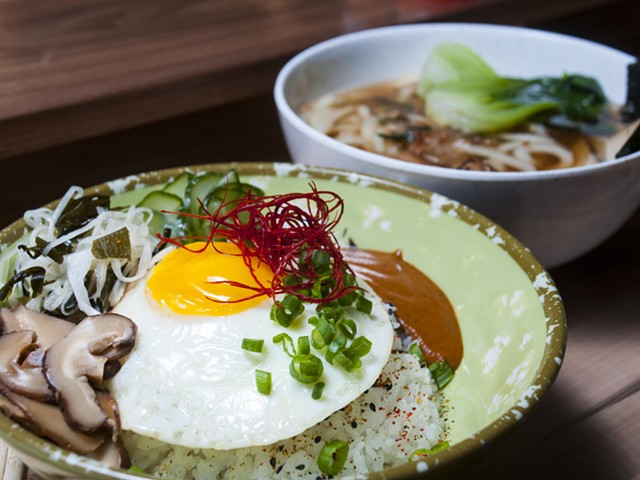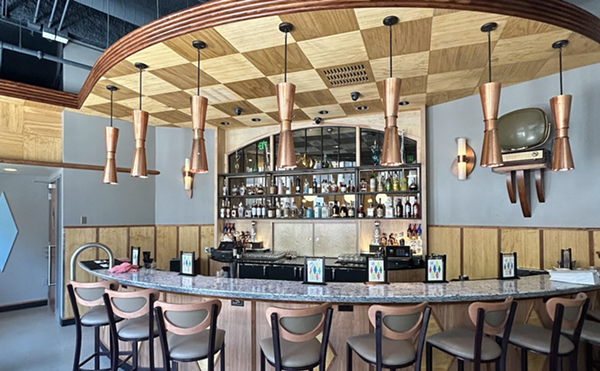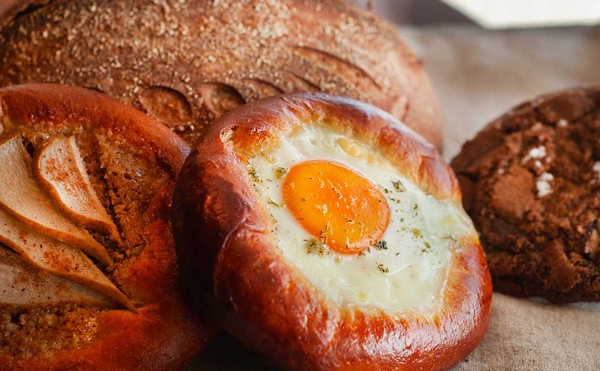(Update: Katoi changed its name on Aug. 23 – two days after this article ran. That story can be found here.)
Noura, a genderqueer person who owns a Midtown coffee shop, swiped right in the dating app Tinder one February afternoon when the profile pic of a Thai woman from San Francisco who was visiting Detroit for a few days popped up.
They got together on a Saturday with no solid plans, but Noura remembered that Motor City Wine was hosting a benefit that evening for Katoi. The hip Corktown Thai-fusion restaurant burned in a suspected arson the previous week, and it seemed that most of Detroit’s restaurant and food community was coming together to support their suddenly unemployed friends at Katoi.
That appeared to be a good event for a Tinder date, but when the pair arrived at Motor City Wine, Noura’s date froze.
“‘Katoi!?” she exclaimed, suddenly and clearly uncomfortable.
Confused for a moment, Noura scanned the room for something amiss. Lots of the town’s coolest folks drank and socialized under signs that beamed “Katoi.” Though Noura knew there was something “weird” about the name, they didn’t know just what. (Noura uses gender-neutral pronouns.)
“What the hell is wrong with this city?” Noura’s date asked. The term “katoi," she explained, is used as an insult for transgender people in Thailand. She questioned how Detroit could allow such a thing to exist.
With that, they left and went to Kelly’s Bar in Hamtramck.
It turns out that that sort of strong reaction to Katoi’s name isn’t uncommon when it comes to those involved with the transgender and Thai communities.
The general problem is this: Three straight white people in Detroit in 2017 are profiting and earning hip points while using a term for an oppressed, marginalized Thai transgender group. The term “kathoey” (a more common spelling than "katoi") is considered derogatory and offensive in most contexts in Thailand, though the transgender community there appears to be in the process of reclaiming it.
Historically, kathoey was a third gender of which there’s no Western equivalent, though it roughly translates to “ladyboy.” Sources say it’s a fluid term in modern times that covers Thailand’s transgender and gay communities.
Those with whom we spoke — including a trans rights activist in Thailand, people in Detroit’s Southeast Asian community, transgender people, Thai-Americans, and LGBTQ people and advocates locally and around the nation — say the use of the term in this context is not OK, and they have called on Katoi to change its name.
But Katoi’s ownership has refused to do so. After Metro Times called the restaurant for comment on Saturday, owners Brad Greenhill and Philip Kafka – who moved here from Brooklyn several years ago – sent a statement via a PR rep reaffirming that position and asserting that “our name empowers us to provide an all too rare space and experience that is open, inclusive, and educational for our team and our guests."
The statement continues, "Because we are KATOI in name and in practice, we have gender-neutral bathrooms as well as a dress code...”
However, that position could change. Noura now tells Metro Times that they met with Katoi general manager Courtney Henriette on Monday and the restaurant is considering a name change. Noura says that they are optimistic that the issue can be resolved with further dialogue. (Contacted Monday afternoon, Katoi’s PR rep says the restaurant has no comment.)
Among those with whom we spoke ahead of the weekend is Kath Khangpiboon. She’s a Bangkok-based transgender activist who founded the Thai Transgender Alliance. She tells Metro Times that she identifies as a kathoey “to reference the culture and history of sexuality in Thailand.” Khangpiboon says she prefers that others refer to her as such when it’s being used in the appropriate context, but says that Katoi is something different.
“They are doing this for marketing and promotion,” Khangpiboon tells us. “That is what makes people upset. ‘Ladyboy’ is worse … and has a stigma, and stereotypes transgender identity.”
Sources say there’s no perfect analogy, but likened the situation to a Thai person opening a gastropub in Bangkok and naming it after an English homophobic slur. Or Katoi’s owners instead opening a soul food restaurant in Detroit and calling it any number of offensive terms. Others charge that Katoi is acting "sneakily" by using an obscure-in-the-U.S. Thai term and questioned (with tongue in cheek, presumably) why the owners won’t be straightforward and name their restaurant “Transgender Burger.”
Ultimately, there's a general feeling that Katoi is commodifying kathoeys. It’s seen as cultural appropriation, and a rather egregious case at that.
Still, the critics love it. The Detroit Free Press named Katoi the city’s best new restaurant, and the James Beard Foundation made it a semi-finalist in its Best New Restaurant category for 2016, though it started running pop-ups in 2014.
But Khangpiboon notes that the equation is missing anything that educates diners about the struggles of Thailand’s transgender population, or any sincere effort to honor the culture. That could have gone a long way in Detroit, where even some local LGBTQ people don’t have a clear idea of the term's meaning.
Instead, there’s a lot of cosmo whimsy on Katoi’s website. The owners say the restaurant is “The Mothership.” The food is “authentic to Planet Katoi.” The press reviews listed on its website are “Interstellar Whispers,” and the section on its site that explains the restaurant’s origins is called “Ladyboy Legends.”
Robert Blackmon, who heads the Los Angeles-based LGBTI advocacy group Alturi, offers some background on kathoeys. He explains that in pre-colonial times, kathoeys were revered and considered mystics. Then white Europeans with their binary sexuality invaded and took over. Kathoeys quickly went from mystics to deviants, they were marginalized, and the term became an insult.
In modern Thailand, transgender people are accepted in pop culture, but the nation’s reputation as a “gay paradise” because the state doesn’t kill or outlaw LGBTQ people is an exaggeration. Blackmon says Thai transgender people can live their lives in the open but don’t have the same rights as non-trans people, and are expected to stay in the entertainment or beauty industries.
Those issues, along with the term’s status as a slur in many instances, are why some in the American Thai community also find it offensive. Bri Wilson, whose mom moved to the U.S. from Thailand in 1970, says her mother was shocked to learn that a restaurant called Katoi is operating in Detroit.
“It’s a derogatory term, especially with the older generations," Wilson says. "I can’t speak to the immediate culture or if it has been reclaimed … but I know when I brought it up to my mother, she said, ‘Who called you that?’ and was upset."
Peggy Gwi-Seok Hong, a Korean-American adult member of the Detroit Asian Youth project, says she approached Katoi’s owners around a year ago and asked that they change their name. She says she’s “dismayed and frustrated” that they have refused to do so.
Among the explanations she was given were some versions of “our gay friend says it’s OK” and "we’re an inclusive restaurant,” but Hong says the former ignores the rest of the community.
“That’s offensive in and of itself because that's trying to co-opt an identity that doesn't belong to them,” Hong says. “That’s the way white supremacy works. White folks have grown up thinking that they have the privilege of using whatever they want that’s around them and exploiting it for their own use.”
To the claims of inclusivity, Hong responds, “So they may have asked a friend, but that friend might not have the perspective of all queer or trans people, or might not consider how it might come across to other Thai folks. Thai friends and their families have been shocked and offended. They would never go to a restaurant called Katoi … because it’s offensive and hurtful.”
Hong also suspects that it’s Thai culture that’s co-opted instead of black culture, for example, because “there aren’t enough of us” in metro Detroit.
Blackmon, who runs Alturi in Los Angeles, also says the only solution is for Katoi to change its name. And he suspects that they would earn a great deal of respect for doing so.
“This is mostly about the fallout of colonization and capitalism for a community marginalized and commodified in Thailand by the economic dislocations of globalization, and in Detroit in the search for an exotic, profitable hipness," he says. "Nothing to be done about the former. Much possibility for correcting the latter. I would just change the name and say, ‘Look we made a mistake,’ and get the good media traction out of it.”






